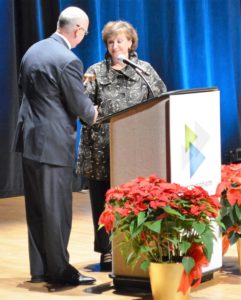
By Michael Tomberlin
Alabama Newscenter
The Birmingham Business Alliance has enjoyed great success bringing industry to the metro area. A new initiative aims to bring people to the area to fill the jobs of tomorrow.
At the 2018 BBA Chairman’s Meeting at the Alys Stephens Performing Arts Center at UAB, the metro area’s leading economic development organization unveiled a talent recruitment plan that officials said will be critical to growth.
“Without question, workforce issues including availability of our workforce, the workforce’s alignment with career opportunities and, third, the perception that Birmingham can deliver a workforce to attract and support employers will be the most important economic development issues we will face in years to come,” said BBA CEO Brian Hilson.
Birmingham Business Alliance to target talent as part of economic development efforts from Alabama NewsCenteron Vimeo.
The BBA has hired New York-based Development Counsellors International (DCI) to help develop the talent recruitment plan. The BBA has worked with DCI for the past few years promoting and building the metro area’s image and recognition in national and international media.
Andrew Levine, DCI chairman, said Birmingham has a good story to tell companies and potential workers.
“You’re at a 3.5 percent unemployment rate in the Birmingham metro area, so companies right now, if they’re going to be able to grow, they have to find employees, they have to find workers,” Levine said.
Levine said by taking this on as a key initiative, the BBA is taking the lead on other cities.

“It is kind of a new day. This unemployment rate has gone down so much and the labor market has gotten so tight, it’s really in the last two years that people have started focusing on talent attraction,” Levine said. “There are some good models out there. I don’t think anyone has completely figured it out. The BBA is really a bit ahead of the game in terms of what other communities are doing, so there is a running start here that we have.”
DCI is compiling data by interviewing human resources directors at Birmingham companies, employees and potential employees and mapping out the important components of talent recruitment in the metro area.
Levine said the question they need to answer is: “How do you market Birmingham not just to companies, not just to visitors, how do you market Birmingham to potential residents?”
He believes the key is to marry talent recruitment with tourism and business recruitment.
“The three things should work all together and be integrated,” he said.
DCI recently surveyed 1,000 millennials, who now make up the largest part of the workforce. The survey sought to discover what is most important to them in choosing a place to live and work.
While the expectation was that issues like arts, entertainment and culture would carry the most weight, the results showed that millennials are practical and care most about the cost of living, housing costs and employment opportunities for their spouses.
Hilson said that shows that any strategy must appeal to a wide range of workers.
“Talent recruitment comes in lot of different flavors and shapes,” he said. “It’s based upon quality of life perceptions. It’s based upon job availability.”

Nancy Goedecke, CEO of Mayer Electric, took over as BBA chairwoman at Tuesday night’s meeting, taking the gavel from Lee Smith from BBVA Compass, who ended his term.
Goedecke said she has found with her business and her efforts in promoting Birmingham to others that the biggest hurdle is getting them to the Magic City to experience it for themselves.
“We have got to continue to develop our talent, get people interested in coming to Birmingham,” she said. “The key is, once we get them to Birmingham they don’t want to leave. We’ve got a real plus in that area, but we’ve got to get them here. There is enough excitement in the air that will attract people to do just that.”
Addressing workforce needs will be necessary for the BBA to build on its momentum since the Great Recession of a decade ago.
Since 2011, metro Birmingham has announced 23,423 new jobs by new and expanding companies that have announced $5 billion in new investment.
So far in 2018, Hilson said the metro area has announced 3,908 jobs by 24 new and expanding companies in the BBA’s core business sectors. That’s about 1,000 more new jobs than at this time last year. Also this year, the seven-county metro area has seen $958 million in new capital investment announced, a $450 million increase over what was announced a year ago.
“While we are on track to meet the job and investment goals that are part of our BBA current five-year strategy, we all agree that a higher level of economic development accomplishment is attainable,” Hilson said. “Therefore, the BBA is adjusting our strategy and our expectations, and we will begin implementing those plans beginning early next year.”
Birmingham Mayor Randall Woodfin is coming off his first year in office and said he recognizes what BBA has done while acknowledging more needs to be done.
“As a city, I believe we’ve seen strong economic progress over the last year,” he said. “We’re grateful to our partners at BBA who have helped us build momentum and we look forward to the work we will continue to do together to move our community forward.”
But not everyone shares in that success, Woodfin said.
“Birmingham is a tale of two cities and each time I have the chance to speak to a set of leaders like each of y’all sitting in this room, I want to share that tension between the success some our businesses feel and the real struggle some our neighborhoods are up against,” he said.
Woodfin noted that 30 percent of the city’s residents and 42 percent of its families live in poverty. The unemployment rate is twice as high among black residents compared to white, and four in 10 black adults have stopped looking for work altogether, he said.

“The bottom line is that we are making progress, but we are not yet where we need to be,” Woodfin said. “We need your help to be the best version of the Birmingham we can be.”
Alabama Commerce Secretary Greg Canfield praised BBA for tackling tough issues related to growing the region.
“The Birmingham Business Alliance plays a critical role and that critical role sometimes probably feels like glue,” he said. “You are kind of sometimes the glue that holds everything together, that keeps the region focused on the prize.”
HIlson said the BBA does play a critical role, but it does so through collaboration with others. That will be true with the new talent recruitment initiative, too.
“For us to be at our absolute best in economic development, we’ve got to be ahead of the curve in growing, developing, aligning, attracting and retaining the diverse workforce that our employers need now and in the future,” he said. “It’s risen in importance in Birmingham, as it should. It’s something the Birmingham Business Alliance, working closely with others, is going to be on top of.
“This is not unique to Birmingham. We see this nationally and beyond,” Hilson added. “But there is an issue of critical mass and it is our responsibility to grow the size of our workforce, but then to also make sure that it’s properly aligned and prepared to do what we need it to do.”




